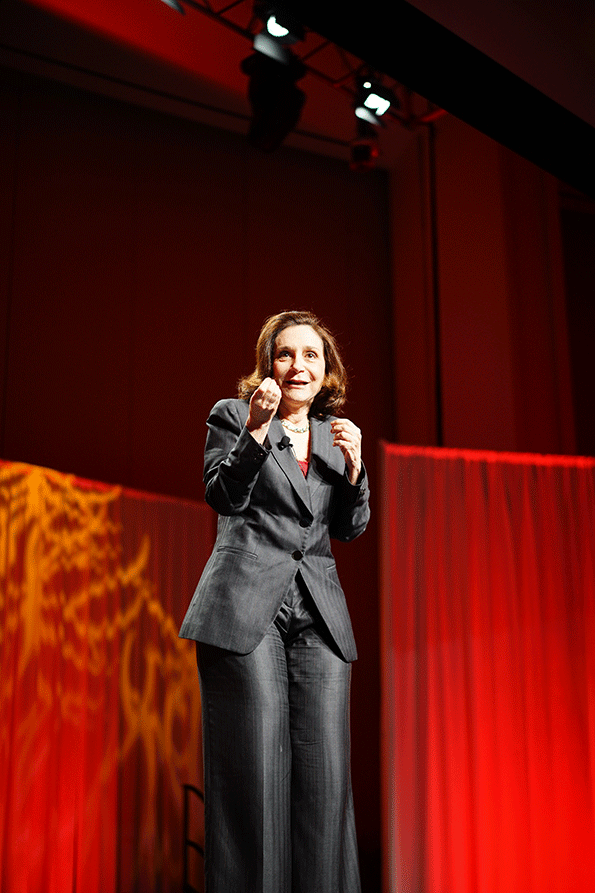
My reaction to psychologist and researcher Sherry Turkle’s closing ASAE general session speech—in which she called mobile technology as potentially devastating to human empathy as our other technological advances have been to the environment, as pointed out by Rachel Carson in her 1962 book Silent Spring—was complicated. She did have research to back up her claim: Markers for empathy in college students dropped 40 percent in the past 10 years, which the researchers said was due to the concomitant rise in their use of mobile devices.
So I started thinking about how, not long ago, I got into a long, and hilarious, discourse on our porch about what the difference might be between monkeys and apes (and no, I have no recollection of how we got started on that topic!). Both our phones were in the house so we couldn’t Google it, and we went down some strange and wonderful paths before we went into the house and looked it up. (Tails. It’s all about tails.) Conversation over.
How many conversations have you had die on the vine when, instead of exploring, thinking, and getting goofy, you just look something up, say, “huh,” and drop it? How many times have you started to get into a good conversation, only to have the other person (or yourself) take a call or check texts, totally disrupting the flow? As Turkle pointed out, even just having the phone on the periphery changes the conversation, keeps it more shallow, because we always have in the back of our minds an awareness that our phones might disrupt us at any moment—something better may be just a text away. Our attention is always, even if only subconsciously, partly on the people in the room, and partly on the people/information/entertainment that's just a click away.
So I agree with that, I get it. And I agree that face-to-face conversations are richer, deeper, and better without the temptation toward texting, tweeting, e-mailing, etc., etc., we feel just knowing that the device is sitting there. They're a multitask just waiting to happen, and that is distracting, especially for us who think doing three things at once is two too few.
Can't Turn Back Now
I do think it’s wrong to blame our devices, or call for a moratorium on them, which she emphatically did not. While I got a very strong feeling that, if she could possibly put that horse back in the barn, Turkle would, she acknowledged repeatedly that there’s no going back for most of us. But it also would be wrong to blithely continue to allow our in-person interactions to get shorter, less meaningful, shallower, and basically a lot less interesting. As she quoted a kid who went to a device-free camp as saying, at camp they talked about what’s inside, their feelings, while at home they talked about what’s on their phones. Guess which type of conversation was more satisfying?
Then just last night I saw an ad on TV for a mobile carrier that showed how great it was that everyone in the house, kids and parents, can be doing their own thing online and completely and happily ignoring each other—isn’t that great, it implied? And another one touting how awesome it is that you can download TV shows and movies and watch them anywhere—you may never have to talk with anyone else again, even on a beach in Hawaii! Or, more to Turkle’s point, be alone with your own thoughts.
She trotted out the study that found people would rather give themselves electric shocks than be alone with their thoughts for a few minutes. Just sitting with yourself can be profoundly uncomfortable, as anyone who has tried to meditate knows all too well. But it’s also one of the most important things we can do. I can’t speak for you, but I get my best ideas walking quietly in the woods with my dog. How can we connect with others—to get to Turkle’s point about empathy—when we can’t connect with ourselves? But I don’t think we can blame devices for this one. Before we had smartphones, we had TVs, books, magazines, puzzles—I’d bet our desire to distract ourselves to keep from having to sit uncomfortably with our thoughts is as old as humanity.
Finding Value in Real Life, and Online, Conversations
What mobile devices do bring to the table is a new way to present ourselves to the world, to edit our lives so only what we want to get through gets through: Hence all those Facebook friends whose posts don’t really much resemble the person you actually know—don't their kids ever do anything that's not cute?—and all those Twitter followers who are much funnier in their tweets than in real life.
But where I stray from Turkle’s party line is that I find great value in the edited life, as well as the unedited one. Ernie Smith makes a great case for it over on the Associations Now blog, which I highly encourage you to check out. Especially for introverts, especially at big awkward social gatherings (ahem, every conference reception I’ve ever been to), being able to meet people I’ve only met previously online can be a lifesaver. (Aside: Holding conversations via social media at a conference isn’t really something Turkle addressed, though it's pretty relevant to us. Since most keynote speakers are not exactly having a conversation with the audience anyway—much the pity—they are fair game for digital interplay for those of use who want to actually have that discussion instead of just listening. But that’s a topic for another post.)
As Smith’s wife pointed out to him, depending on presenting ourselves through social media can be a crutch, but when you’re hobbled by social situations, isn’t a crutch exactly what you need? I have no shame in owning that one, though I don’t really edit myself much in my online interactions—what I tweet is pretty much who I am, fortunately or unfortunately. Turkle, who said, “We like to keep each other at a digital distance, but human connection is messy,” obviously has never sent out the messy tweets and “oops” Facebook posts that I have! You want messy? You got it, whatever the communication channel. I may just be a data point of one on that one, but somehow I doubt it.
And I have a lot of respect for the online communication channels. I have had some pretty profound conversations on various social media, connected with amazing people doing amazing things, and heard the highlights of speeches presented thousands of miles away, tweet by tweet. The power of it all is not something to be trivialized.
But I think it’s a mistake to lean too heavily, too easily, and too often on our edited, controlled online voices without balancing it with our real, sometimes hesitant, possibly awkward at times, not-always-right in-person voice. Because we have to own that part of ourselves as well, which isn’t always as easy or as instantly gratifying.
And really, working toward that balance is all that Turkle really asked us to do, ending with this quote: “It’s often in the moments when we stumble and when we hesitate and when we fall silent that we most reveal ourselves to each other,” she said. “Digital communication has gotten us accustomed to the edited life. Consider that the unedited life is also worth living.”
So yes, I have committed myself to taking her suggestions to create some iPhone-free zones, and cultivate solitude where I can concentrate on my own thoughts, and follow a conversation through both its high points and its dips without resorting to pulling out a mobile device to see if something more interesting is happening elsewhere (which after all is just common courtesy). I also will try harder to really listen to what others are saying instead of thinking up my next witty reply, be it online or IRL. Just one more quick story before I end this never-ending post:
I recently sat next to a stranger at lunch at a conference. She was holding very much to herself, and answered my usual icebreaker questions (brilliant things like, "What did you think of the keynote speaker this morning?") monosyllabically. I am not good in this type of situation, and usually would soothe my feeling of awkwardness by pulling out my phone and pretending like I didn't really care she was rebuffing me because, hey, I'm so busy on my phone. Instead, I kept going until somehow we managed to find one thing we could connect on, then another, and by the end of lunch she was sharing her dreams for the future with me. We had a real conversation, and it made my day, and all I had to do was listen, really listen, to find out what was important to her. And this was before I heard Turkle's talk.
Mobile devices are not killing empathy. If empathy is in fact on the wane, which I'm not entirely convinced it is, it is our unwillingness to cultivate empathy, our increasing distractibility, and our fear of revealing our true self to others—and of being given the gift of others revealing their true selves, that are the culprits. Smartphones are just the messengers; it's what we do with them, and how, that is the real message we're sending.
| Suggested Categories | More from MeetingsNet |
|
|
|
 |
|




